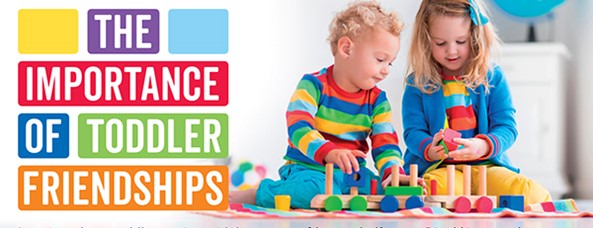The Importance of Toddler Friendships

Guest post by Northampton High School.
Imagine a busy toddler session with lots of children running around. Two-year-old Hattie swoops in to scoop up a red car and push it down the ramp next to three year-old Ellie. Close by, two one-year-olds are banging their cars on a chair, both enjoying making noise. Scenes like these are familiar to many parents all over the world but when does this ‘parallel play’ become ‘playing together’? When does ‘being together’ become ‘meaningful social interaction,’ and why is it so important? In the past, many experts said that young children were incapable of making friends until the age of three, believing that children could not make a true connection until then. However, more recent research has demonstrated that although children may not express their friendships in the same way as adults, they are still forging friendship bonds with those around them. Young children will start with mimicking others, observing and tentatively copying behaviour.
As they grow, this will develop into imaginative play and real interaction. Children as young as one year old can express delight in seeing a familiar little face and can laugh with another child, and it’s these small cues that show early friendships. Although academic and extracurricular activities become more important as children grow, we should still strive to make friendship a top priority for children. Creating strong friendships will develop life skills that will increase a child’s wisdom, confidence and self-esteem. Friendships can make a child feel secure, and they provide an outlet for children to communicate their concerns, dreams and fears. In friendship groups, leadership skills can be tested and coping strategies can develop, which helps children deal with conflict and adversity.
Learning how to choose who to be friends with is a life skill in itself, so it’s important that children are given the opportunity at an early age to choose true, kind friends. Having these true friends will also help to reduce any feelings of isolation and loneliness as a child grows older and develops. Playing is fantastic for the imagination. By playing together, children can create feelings of joy and happiness, which positively impact their mood, attitude and drive to succeed. With friendship being so important, and evidence that friendships can begin very early on in childhood, we should try to expose our children to lots of opportunities for interaction, and encourage them to learn how to become friends. For example, regular play sessions can bring the same group of children together, and this gives them the opportunity to build on sharing jokes, playing at the same time and enjoying activities together. These are just some of the many ways to foster relationships.
Having a child attend a nursery setting can also aid friendships as there are lots of children to mix with but the same faces will always appear. In a nursery, there are multiple and varied opportunities for interaction in a safe and familiar environment, and with time away from parents, a child can start to build on their own independent skills in making friends. So ‘being together’ is always an opportunity for ‘meaningful interaction,’ and it is never too early to have a friend.
Written by Northampton High School. Everyone is welcome to visit any of their open events.
Please contact admissions on nhs.admssions@nhs.gdst.net to find out more.